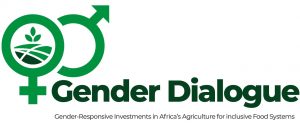Официальная обратная связь диалога для Саммита ООН по продовольственным системам 2021 года
Виды диалогов
Организатор
Дата/время
Окончание
Местоположение
Формат
Просьба ознакомиться с приводимыми ниже данными для получения регистрационной информации, если таковая имеется, или обратитесь к руководителю диалога, если желаете принять участие.
Куратор
Описание
Gender-Responsive Investments in Africa’s Agriculture for Inclusive Food Systems
Within the context of the United Nation’s Food Systems Objectives of the Decade of Actions towards the attainment of the SDGs, the Forum for Agricultural Research in Africa and the African Women in Agricultural Research and Development (AWARD) will co-host an independent dialogue.
The two institutions have mandates that are gender-sensitive and therefore desire to co-convene the African stakeholders to dialogue on the gender dimensions of the noble goals of the Summit and how these two institutions can contribute their synergistic quota.
Women make significant contributions to the economy in their role as entrepreneurs, on-farm workers, employees, food processors, and through unpaid home-based chores. With more than 60% of the smallholder food production systems in Africa being powered by women, the food system in Africa is largely skewed in favor of the womenfolk. They play a vital role in African agriculture, doing most of the work to produce, process, and market food. To better address their priorities and challenges, there is an urgent need to strengthen African women’s voice in the agricultural sciences.
However, it is important to note that the engagement of unique groups of actors in the value chains is hampered by the constraints these groups face. Women are underrepresented and under-resourced concerning their involvement in specific value chains. Similarly, female participation in agricultural research and higher education has been particularly low in Africa and currently stands at 24%.
This gap does not only hinder women’s productivity but also reduces their contributions to the agricultural sector and the achievement of broader economic and social development goals (FAO, 2011)[1]. Largely, gender-related bottlenecks to the involvement in agriculture have an impact on enterprise development, productivity of both men and women, and competitiveness in Africa. Given that the 2016 Africa Human Development Report suggests that gender inequality costs Sub-Saharan Africa approximately 95 USD billion per year[2], investing in gender-smart approaches to agribusiness might lead to economic benefits.
To address this lingering disparity, FARA and AWARD seek to raise awareness at the highest possible quarters at the UN-FSS through their Independent Dialogue and elaborate workable action plans that can be vigorously pursued after the summit.
[1] [1] FAO. (2011). The Role of Women in Agriculture. Rome: FAO
[2] C. Leigh Anderson et al., “Economic Benefits of Empowering Women in Agriculture: Assumptions and Evidence,” The Journal of Development Studies 57, no. 2 (February 1, 2021): 193–208, https://doi.org/10.1080/00220388.2020.1769071.

